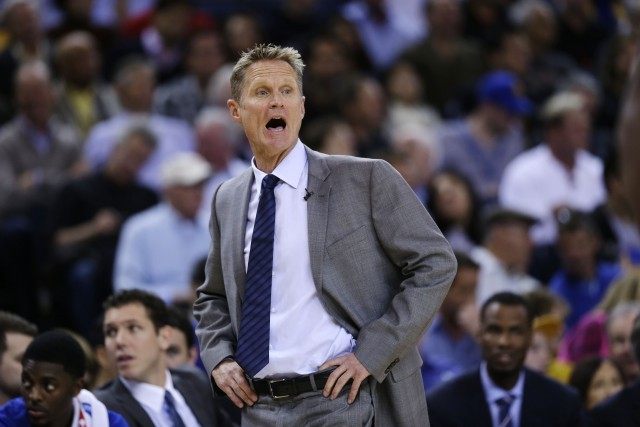Thirty-one-years ago, Islamic terrorists murdered the president of the American University of Beirut. Tonight, his son coaches a Golden State Warriors team on the verge of an NBA championship.
“The president of the American University of Beirut, Malcolm H. Kerr, was killed here today when unidentified gunmen fired two bullets into his head while he was walking to his office,” Thomas Friedman reported from Beirut on January 18, 1984. The New York Times correspondent continued, “Dr. Kerr, carrying his briefcase in one hand and an umbrella in the other, stepped off the elevator on the third floor and walked about 12 paces, heading for his office at the end of the hallway…. A split second later the two gunmen stepped forward, either from the elevator or the stairwell just to the right of it, and one of them quickly pumped two bullets into Dr. Kerr’s head with a silencer-equipped revolver.”
Kerr, whose parents taught at the institution, took the job after the kidnapping of his predecessor. He dismissed the bodyguards assigned to him and walked tall as a recognizable figure on the campus not-so cloistered from the chaos that surrounded. Seventeen months after Kerr’s tenure as president began, it ended for the 52-year-old with a coward’s bullet to the back of his head.
“We are responsible for the assassination of the president of the American University of Beirut, who was a victim of the American military presence in Lebanon,” a group calling itself Islamic Holy War, believed to be Hezbollah, told Agence France-Presse. “We also vow that not a single American or Frenchman will remain on this soil.”
The following month, President Ronald Reagan ordered the withdrawal of the U.S. military from Lebanon. The Beirut Barracks Bombing of October 23, 1983, the deadliest day for the U.S. Marines since World War II, had left Americans wondering what good, less than a decade after the fall of Saigon, our men in uniform did in Lebanon. Malcolm Kerr wasn’t a victim of “the American military presence in Lebanon.” He was a victim of Islamic terrorists who, as their killings and kidnappings of Westerners subsequent to Reagan’s troop withdrawal indicates, objected to the presence of any Westerner.
But even calling Malcolm Kerr a Westerner may mislead. Born, like Steve Kerr, in Beirut, Malcolm Kerr certainly held a more credible claim as a local than the Iranian-backed terrorists who killed him. He went to school, met his wife, raised his four children, and worked in Beirut. He authored and edited six books on the Middle East. And he died the violent way many Lebanese died in the 1970s and 1980s.
An 18-year-old Steve Kerr coped with the death of his father via a particularly effective form of therapy developed by Dr. James Naismith. “Coach,” Kerr told Arizona’s Lute Olson, “the only time I can keep from thinking about my dad is when I’m playing basketball.”
So, he played. At Arizona, which later retired his number 25, he helped the Wildcats reach their first Final Four during his senior season. In the NBA, he won five titles with the Chicago Bulls and San Antonio Spurs. After setting the single-season record for three-point-shooting accuracy in college, he set the career mark in the NBA.
Tonight in Cleveland, Kerr looks to win an NBA title in his rookie season as a head coach. Ironically, unrest in the Middle East plays as a large part of the story of his adversary pacing in front of the Cleveland bench. David Blatt played in Israel for more than a decade and coached there for nearly two decades. When fighting broke out last summer, Blatt, who quickly purchased tickets to return to Israel, explained: “I don’t feel comfortable not being in Israel at a time like this.”
That’s how Malcolm Kerr felt about Lebanon. So he returned when others left.
“Since he was a little boy, all Malcolm ever really wanted was to be president of A.U.B.,” Professor Edwin Prothro told the New York Times upon his friend’s death. “When the time came, he knew his life could be in danger—he talked about it to me several times—but he took the job anyways because he loved this place and he wanted to build it into something special. In the end he was killed not for who he was or what he did, but for what he symbolized to others who never even knew him.”
Beirut called Malcolm Kerr. Basketball called Steve Kerr. After a 67-15 season and one win away from a championship, the son has the opportunity in his vocation denied to his father in his. Steve Kerr hopes to say after tonight that he built “something special” in Oakland.

COMMENTS
Please let us know if you're having issues with commenting.